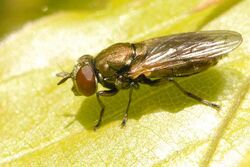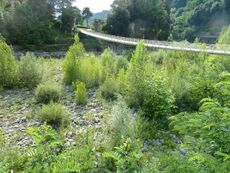Biology:Orthonevra geniculata
| Orthonevra geniculata | |
|---|---|

| |
| Orthonevra geniculata female | |
| Scientific classification | |
| Kingdom: | |
| Phylum: | |
| Class: | |
| Order: | |
| Family: | |
| Genus: | |
| Species: | O. geniculata
|
| Binomial name | |
| Orthonevra geniculata Meigen, 1822
| |
Orthonevra geniculata is a species of hoverfly found in the Palearctic.[1][2]
Description
External images
For terms see Morphology of Diptera
Wing length 4·5-5·5 mm. Face with triangular white marks. Legs yellow. Wing vein r-m brown. Pterostigm bicolorous: pale with dark area at base. Maibach et al. (1994) figure the male terminalia.[3]
See references for determination.[4][5][6][7]
Distribution
Palearctic North Norway to Belgium. Ireland East through North Europe and Central Europe. North Italy. European Russia to the Russian Far East, Siberia and Mongolia. [8][9]
Biology
Habitat: Quercus forest (beside springs, flushes and brooks). Alnus and Salix habitats carr, fen and margins of raised bogs.[10] Flowers visited include Anemone nemorosa, Bellis, Caltha, Cardamine, Malus sylvestris, Menyanthes, Prunus spinosa, Ranunculus, Salix, [11] The flight period is mid April to mid May.The larva is associated with springs and wet flushes.
References
- ↑ Stubbs, Alan E.; Falk, Steven J (1983). British Hoverflies: An Illustrated Identification Guide (2nd ed.). London: British Entomological and Natural History Society. pp. 253, xvpp. ISBN 1-899935-03-7.
- ↑ Ball, S.G.; Morris, R.K.A. (2000). Provisional atlas of British hoverflies (Diptera, Syrphidae). Monks Wood, UK: Biological Record Centre. pp. 167 pages. ISBN 1-870393-54-6.
- ↑ Maibach, A., Goeldlin de Tiefenau, P. & Speight, M.C.D. (1994) Limites génériques et caractéristiques taxonomiques de plusieurs genres de la Tribu des Chrysogasterini (Diptera: Syrphidae) 1.Diagnoses génériques et description de Riponnensia gen.nov. Ann. Soc. Entomol. Fr. (N.S.), 30: 217-247.
- ↑ Van Veen, M. (2004) Hoverflies of Northwest Europe: identification keys to the Syrphidae. 256pp. KNNV Publishing, Utrecht.addendum
- ↑ Van der Goot,V.S. (1981) De zweefvliegen van Noordwest - Europa en Europees Rusland, in het bijzonder van de Benelux. KNNV, Uitgave no.32: 275pp. Amsterdam.
- ↑ Bei-Bienko, G.Y. & Steyskal, G.C. (1988) Keys to the Insects of the European Part of the USSR, Volume V: Diptera and Siphonaptera, Part I. Amerind Publishing Co., New Delhi. ISBN:81-205-0080-6.
- ↑ Coe, R.L. (1953) Diptera: Syrphidae. Handbks.ident.Br.insects, 10(1): 1-98. R.ent.Soc.London. pdf
- ↑ Fauna Europaea
- ↑ Peck, L.V. (1988) Syrphidae. In: Soos, A. & Papp, L. (eds.) Catalogue of Palaearctic Diptera, 8: 11-230. Akad.Kiado, Budapest.
- ↑ Speight, M.C.D. (2011). "Species accounts of European Syrphidae (Diptera)". Syrph the Net, the database of European Syrphidae 65: 285pp. http://www.diptera.info/downloads/StN_Species_Accounts_Glasgow_2011.pdf.
- ↑ de Buck, N. (1990) Bloembezoek en bestuivingsecologie van Zweefvliegen (Diptera, Syrphidae) in het bijzonder voor België. Doc.Trav. IRSNB, no.60, 1-167.
Wikidata ☰ Q2745717 entry category:Taxa named by Johann Wilhelm Meigen


